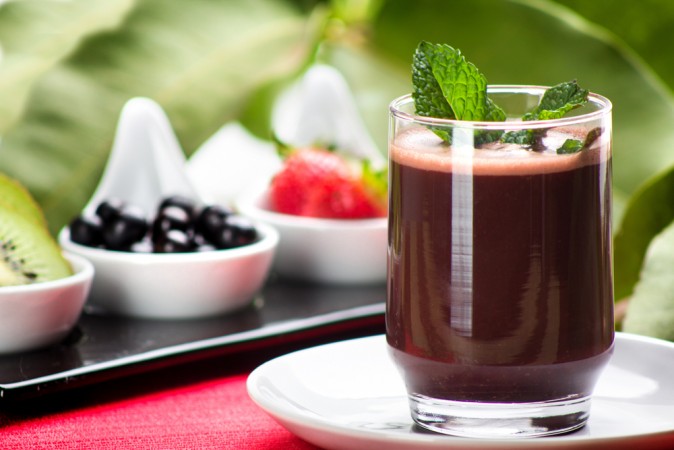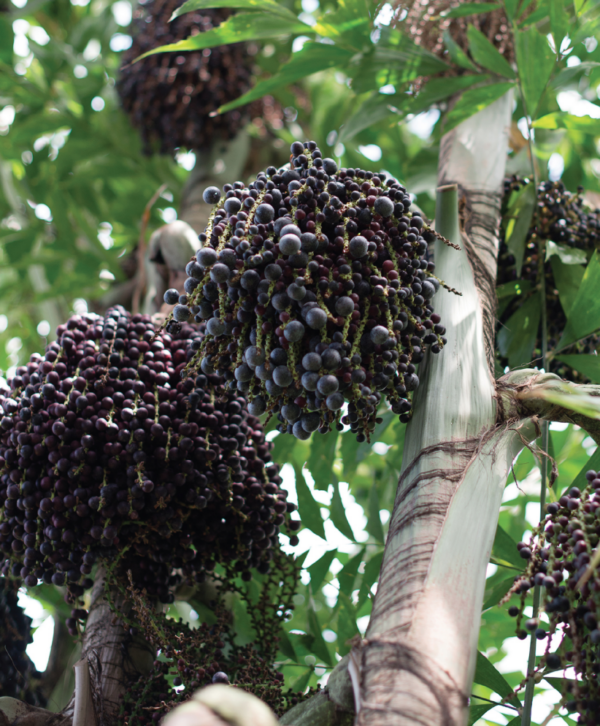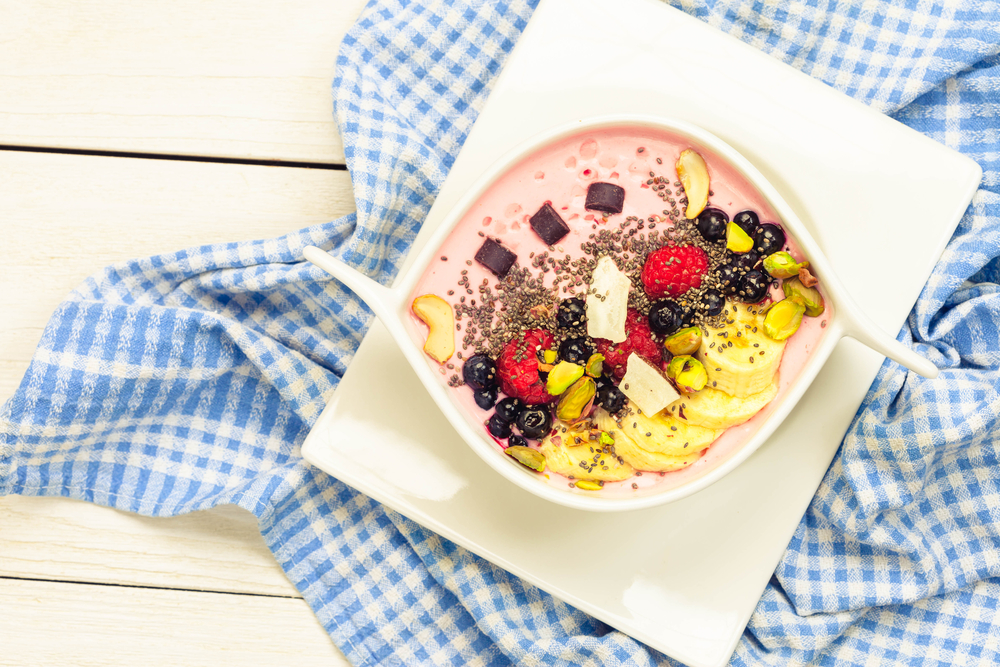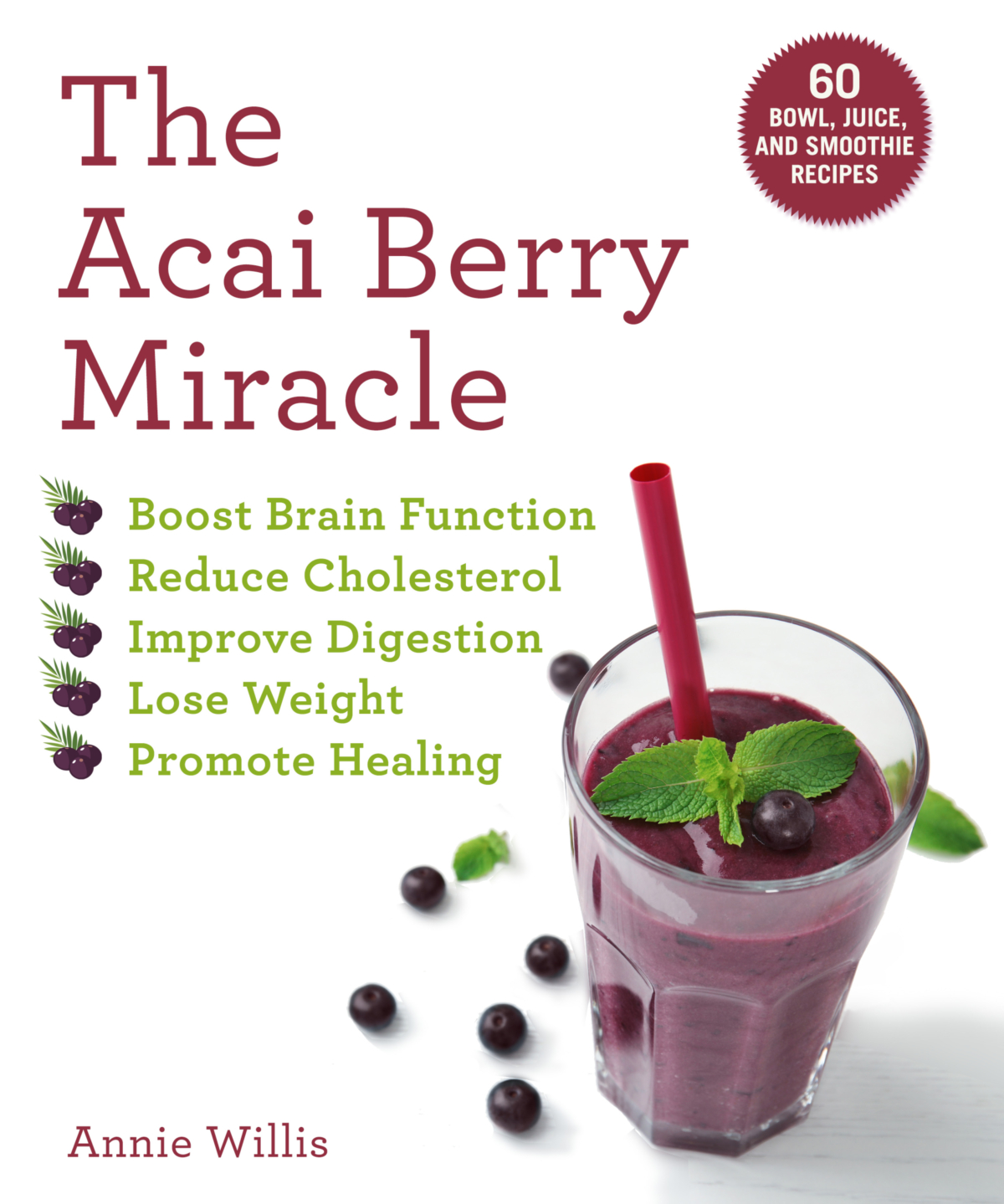How a small, purple berry can transform your health and wellness.
Editor’s Note:
The following excerpt has been adapted from the book “The Acai Berry Miracle,” by Annie Willis—an extensive introduction to the deep purple acai fruit from the Amazon. Perplexed by what to do with the little gems? Wonder no more—Ms. Willis illuminates us with 60 bowl, juice, and smoothie recipes perfect for every season or occasion.
The Powerful Acai Berry
Acai has become a mainstream flavor that’s synonymous with wellness. You almost expect to see it listed (usually alongside blueberry) in healthy options like yogurts and teas. But you can also find it promising to imbue its mysterious powers of good health in everything from chocolates to energy drinks. This magical berry seems to have popped up overnight and taken over grocery stores everywhere.
But there’s nothing mysterious or magical about acai—it’s just a humble little fruit that’s jam-packed with healthful vitamins, minerals, and antioxidants. Although it only made its way to the United States in the early 2000s, acai has been a nutritious staple of its native countries for centuries. To the generations who grew up with it, eating acai is like enjoying a handful of blueberries.
If you’re in the States, though, you’re not likely to find acai in your local produce aisle. Acai is highly perishable and must be processed and frozen within hours of picking. Unless you have a tropical greenhouse in your backyard, you’re most likely to find acai as a frozen puree or freeze-dried powder.
No matter what form you find it in, acai will still deliver its miraculous nutritional benefits. You can enjoy more energy, a stronger immune system, better digestion, improved brain function, lower cholesterol, glowing skin, and more. Let acai help you take control of your health and get ready to feel amazing!
 |
| (Shutterstock) |
Acai Facts
First things first—how on earth do you say it? Acai is pronounced ah-sigh-EE. This deep purple fruit is native to tropical Central and South America, and the name is a Portuguese adaptation of the indigenous word for it. (That’s why you’ll often see it written as açaí.) You’ll find acai berries on the açaí palm, or Euterpe oleracea, a tree that can grow up to 100 feet tall, with leaves up to 10 feet long. The berries grow in clusters on dense branches beneath the leaves, with each branch bearing between 500 and 900 fruits.
But acai “berries” aren’t berries at all—they’re drupes (fruits that have pits, like cherries and apricots). Although they look like blueberries, the edible portion of acai is just a thin outer layer over a pit that generally takes up 80 percent of the fruit. And the taste is nothing like a sweet, juicy, ripe blueberry, either. Instead, it’s often described as something between a blackberry and dark chocolate. (And if you think that sounds earthy and a little bitter, you’re right. Often, you’ll find this low-sugar fruit mixed with something sweeter.)
As you might imagine, harvesting acai berries from their giant palms is a challenge. For centuries, locals have been climbing the trees in bare feet, with no equipment, and harvesting 10-pound branches of berries by hand. And that’s exactly how it’s done today. Because acai is so highly perishable, it’s quickly loaded into hand-woven baskets and transported by boats to processing plants. Within hours, the berries are washed, pureed, and frozen for packing and shipping all over the world.
The Many Benefits of Acai
With a powerful combination of antioxidants, vitamins, minerals, and other nutrients, acai earns the title of “superfood.” Compare the fruit to another well-known superfood—blueberries—and you’ll find that acai has more antioxidants, protein, calcium, iron, and vitamins A and C, plus acai is higher in healthy fats and lower in sugar. And with credentials like that, it’s no wonder acai has such a tremendous effect on your health. But what exactly makes acai so miraculous? Read on to discover how each of acai’s nutritional components can help you lower your blood pressure, cholesterol, and blood sugar; boost your immune system and brain function; stop the signs of aging in their tracks; and even help protect you from chronic illness and cancer!
 |
| Photo courtesy of Skyhorse Publishing. |
Antioxidants and Phytonutrients
By now, you probably know that antioxidants are good for you because they fight free radicals, but you might not know what that means. In short, it means that antioxidants keep your cells healthy.
Free radicals are unstable atoms that attach to healthy cells and cause oxidative damage or stress. And that damage can lead to little things, like wrinkles, or big things, like the inflammation associated with chronic illness and certain types of cancer. Your body naturally fights free radicals, but it needs all the help it can get. In addition to your body making them, free radicals come from exposure to toxins, such as pollution or cigarette smoke.
Antioxidants like the ones found in acai bind to free radicals so that they’re no longer free to bind to healthy cells and cause problems. By simply digesting acai and other antioxidant-rich foods, you release these helpful nutrients into your bloodstream to uncover any lurking free radicals. And antioxidants alone can do you so much good!
It’s thanks to its antioxidants that acai has been shown to stop cancer cells from forming and spreading. Plus, the fruit is neuroprotective because antioxidants counteract the damaging effects of inflammation and oxidation in brain cells. Studies also show that it helps improve memory and allows the brain to clean up toxic cells and make way for new nerves. In other words, the antioxidants in acai help your brain fire on all cylinders. And you can find them hiding in plain sight among several nutrients, including vitamins C and E, polyphenols, and phytonutrients like anthocyanins.
Anthocyanins and Other Flavonoids
If you’ve ever mentioned the antioxidants in wine as an excuse to pour yourself another glass, then you’re already familiar with anthocyanins. They’re the antioxidants that give red wine (and acai) its coloring and its reputation for supporting good health.
Although all twelve of the flavonoids in acai have antioxidant effects, anthocyanins may be the most beneficial. Their anti-inflammatory properties may help ease symptoms of chronic illness, protect against neurogenerative diseases, improve blood flow to the brain, and enhance your memory. Anthocyanins have also been shown to reduce the risk of heart attack by 32 percent in young and middle-aged women when consumed regularly.
Plus, anthocyanins have powerful cancer-fighting effects. Anthocyanins have been shown to activate detoxifying enzymes, stop cancer from spreading, kill cancer cells, and even prevent cancer from forming entirely. So, you can feel good about that glass of wine, but you’ll feel even better with a glass of acai, which contains up to 30 times the anthocyanins.
Polyphenols
Fun fact: Like acai, cacao beans are rich in polyphenols, which may partially explain the similar flavor between the two. It definitely explains why both are heart-healthy superfoods. Polyphenols are the largest group of phytochemicals found in plants. And like other phytochemicals, they may help combat the inflammation linked to heart disease and neurodegenerative illnesses. But that’s not all—they’ve also been shown to improve digestion, balance blood sugar, and aid weight loss. Plus, the polyphenols in acai may help improve your blood flow by boosting nitric oxide in the endothelial cells that line the arteries and blood cells, and that relaxes the arteries and improves your blood pressure.
Vitamins
You know you need vitamins. They energize you, strengthen your immune system, help your body heal, protect your heart, and so much more. But did you know that your body can’t produce vitamins? In fact, the only way to get the vitamins you need is to consume them through nutrient-rich foods like acai. So when you combine acai with other nourishing ingredients in smoothies and bowls, you’re actually creating a powerful (and delicious) multivitamin. Acai’s contribution includes vitamins A, C, and E, as well as three different B vitamins.
Vitamin A
The vitamin A you get from fruits and veggies comes from the antioxidant beta-carotene—the same eyesight-enhancing nutrient found in carrots. Vitamin A is also vital for immune and reproductive health, good skin, and cell growth. And one serving of acai contains 15 percent of the recommended daily value of vitamin A.
Although you can find plenty of fruits and veggies that are high in vitamin A, you won’t find any with the healthy fats that acai contains. And it’s those healthy fats that help your body absorb vitamin A and gain its benefits. (Of course, you can also top your acai bowl with yummy ingredients like avocado, almonds, dark chocolate, or chia seeds for an extra dose of healthy fats.)
 |
| (Jarvna/Shutterstock) |
Vitamin C
Acai may not technically be a berry, but it carries the same amount of powerful vitamin C as its look-alike, the blueberry. And if you’ve ever reached for a glass of orange juice at the first sign of the sniffles, you already know the importance of vitamin C. Not only does it support your immune system, it also can protect your heart, prevent eye disease, fend off free radicals, and fight the signs of aging. Plus, it’s essential for healing and the formation of blood vessels, cartilage, muscle, and collagen in bones. Want to maximize those benefits? Add other vitamin C–rich foods to your acai bowls, including citrus, kiwi, and, of course, blueberries.
Vitamin E
Want a healthy immune system? Glowing skin? Good vision? Then you’re going to need the antioxidant benefits found in vitamin E. And as an antioxidant, vitamin E can also help protect your cells against the oxidative stress that can lead to inflammatory illnesses like arthritis and serious conditions like Alzheimer’s and cancer. That’s why vitamin E supplements are so popular, but they can’t provide the benefits of the naturally occurring antioxidants found in food. Like vitamin A, vitamin E is fat soluble, so make sure you eat your acai with foods full of healthy fats (like almonds or chia seeds) to help your body absorb the vitamin.
B Vitamins
Have you ever noticed that B vitamins are listed on the ingredients label of nearly every energy drink? That’s because they help the body convert food into energy, create new blood cells, and maintain healthy brain cells. In other words, B vitamins are essential for your energy levels and brain function. And acai happens to have a few of these superstars on its roster.
- Vitamin B1 (thiamine). In addition to helping you convert food into energy, thiamine plays an important role in nerve, muscle, and heart function. It’s also essential for glucose metabolism, which helps you balance your blood sugar and energy levels.
- Vitamin B2 (riboflavin). With an extra boost of antioxidant properties, riboflavin prevents cell damage as well as helping your body produce red blood cells. Plus, a regular dose of vitamin B2 has been shown to prevent cataracts and migraines.
- Vitamin B3 (niacin). Niacin stands out among the B vitamins because every part of your body needs it to function properly. In the right amount, it may also help lower cholesterol, prevent heart disease, treat Type 1 diabetes, protect skin cells, ease arthritis, and boost cognitive function. (Too much niacin can cause trouble, but it’d be very hard to get too much from food.)
Minerals and Electrolytes
Several of the minerals that acai contains are also electrolytes, which are electrically charged minerals that help your body do things like make your heart beat (a muscle contraction) and help your blood clot. Calcium, magnesium, manganese, potassium, and phosphorus are all electrolytes. Not getting enough electrolytes can wreak havoc on your system, but don’t reach for that sugary sports drink just yet! Barring illness, a balanced diet full of healthy veggies and fruits like acai should be all you need.
This excerpt has been adapted from “The Acai Berry Miracle” by Annie Willis. To buy this book, click here.
Annie Willis is passionate about health and wellness. After years of poor health and exhaustion, she found relief in whole, healthy foods and fell in love with preparing them at home. Annie lives in Colorado with her husband and their two dogs.
Important Notice: This article was originally published at www.theepochtimes.com from the Epoch Health Bookshelf where all credits are due.
Disclaimer
The watching, interacting, and participation of any kind with anything on this page does not constitute or initiate a doctor-patient relationship with Veripeudic.com. None of the statements here have been evaluated by the Food and Drug Administration (FDA). The products of Veripeudic.com are not intended to diagnose, treat, cure, or prevent any disease. The information being provided should only be considered for education and entertainment purposes only. If you feel that anything you see or hear may be of value to you on this page or on any other medium of any kind associated with, showing, or quoting anything relating to Veripeudic.com in any way at any time, you are encouraged to and agree to consult with a licensed healthcare professional in your area to discuss it. If you feel that you’re having a healthcare emergency, seek medical attention immediately. The views expressed here are simply either the views and opinions of Veripeudic.com or others appearing and are protected under the first amendment.
Veripeudic.com promotes evidence-based natural approaches to health, which means integrating her individual scientific and clinical expertise with the best available external clinical evidence from systematic research. By individual clinical expertise, I refer to the proficiency and judgment that individual clinicians acquire through clinical experience and clinical practice.
Veripeudic.com does not make any representation or warranties with respect to the accuracy, applicability, fitness, or completeness of any multimedia content provided. Veripeudic.com does not warrant the performance, effectiveness, or applicability of any sites listed, linked, or referenced to, in, or by any multimedia content.
To be clear, the multimedia content is not intended to be a substitute for professional medical advice, diagnosis, or treatment. Always seek the advice of your physician or other qualified health providers with any questions you may have regarding a medical condition. Never disregard professional medical advice or delay in seeking it because of something you have read or seen in any website, video, image, or media of any kind. Veripeudic.com hereby disclaims any and all liability to any party for any direct, indirect, implied, punitive, special, incidental, or other consequential damages arising directly or indirectly from any use of the content, which is provided as is, and without warranties.


